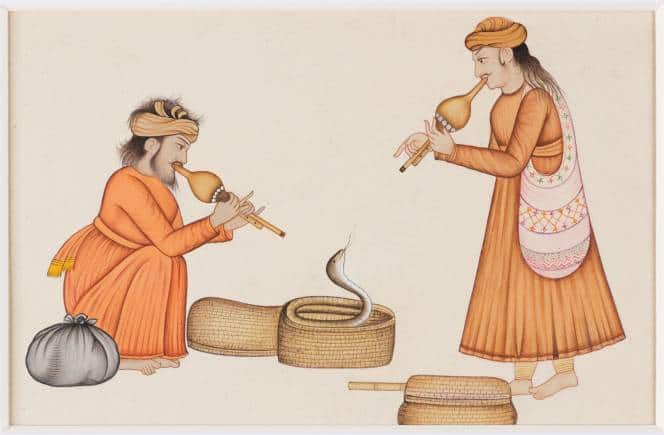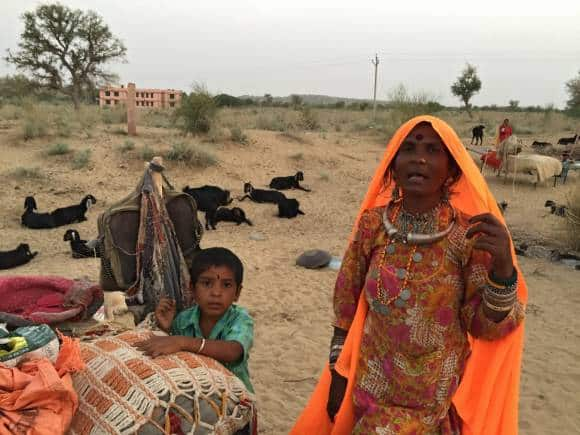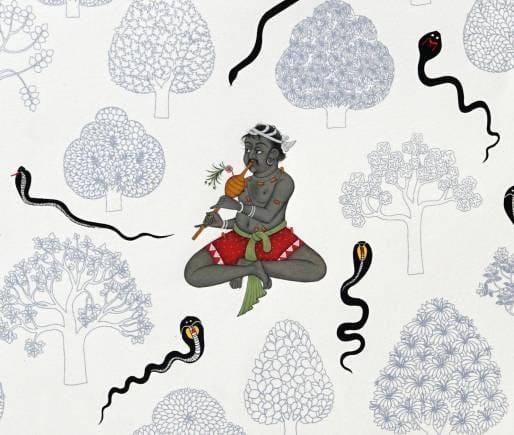



Kanifnath, a disciple of Jalandar Nath, one of nine gurus of the Nath sect lived in the desert of western Rajasthan during the 12th Century AD, under the Jodhpur princely state. The then king, Gopichand, invited the Nath Gurus and their disciples for a feast and asked them for their preferred dish. Kanifnath demanded the venom of all snakes, which no one was able to provide. He collected the venom himself and asked the Gurus if they would like to try it. This annoyed the highly revered Gorakh Nath who challenged Kanifnath to drink it. As Kanifnath drank, his throat turned blue and he closed his eyes to digest it. This episode led to Kanifnath being recognised as Neel Kanth Mahadev (synonym of Lord Shiva with blue throat) and resulted in Kanifnath being outcasted (Kaar-baria in Marwari). At a later date, Kanifnath's followers started being called Kaalbelia. The followers started living a wandering life, earning out of snake-charming.
 Painting of saperas by miniature painting artist Lukman from Kota, Rajasthan. (Photo: Madan Meena)
Painting of saperas by miniature painting artist Lukman from Kota, Rajasthan. (Photo: Madan Meena)
The community has various synonyms in different parts of the country, their main identity was snake-charming for which they were popularly known as sapera. The community had immense knowledge around the subject of snakes and was highly regarded for their skill in catching snakes and treating snake and scorpion bites. But all was not going well for the Kalbelias, a section of them who identified themselves as wandering Jogi ascetics were listed under the British Criminal Tribes Act of 1871, even after independence that stigma has remained and the police continue to look at them as offenders.
Then the, ‘Prevention of Cruelty to Animals Act 1960’, ‘Wildlife (Protection) Act 1972’, the banning of snake skin trade and stringent forest laws criminalised their traditional practice of snake-charming without proposing any alternative options.
 Kalbelia camp outside Barmer in the desert. (Photo: Madan Meena)
Kalbelia camp outside Barmer in the desert. (Photo: Madan Meena)
Losing their traditional practices, their living condition deteriorated, compelling them to disguise themselves as holy men and fortune tellers (jyotish) and roam around begging for livelihood. Their women dance to the music of a been (twin flutes, also called poongi), for which they became popular internationally and were recognised by UNESCO under the Representative List of the Intangible Cultural Heritage of Humanity (2010), this created a livelihood option for some, but largely their children and women collect plastic and other waste from the streets and Kalbelia youth is majorly into scrap collection and in the unorganised labour sector.
A recent survey by Bhasha Research and Publication Centre, Vadodara highlights that even after 75 years of independence, the Kalbelia are landless and live on the fringes of forests and village outskirts. They face mob-lynching, are attacked by dominant villagers and their huts are burnt down to remove them. As they have no burial grounds, they are compelled to bury their dead within their living premises. Literacy is around 40 per cent, majority of children drop out of schools at primary level and the community faces systematic socio-economic discrimination, Though categorised as Scheduled Tribes, their reservations benefits are negligible, 90 per are below poverty line but only 29 per cent have BPL cards. The woes are endless further compounded by COVID-19.
The ‘Wildlife (Protection) Act 1972’ and other follow up actions did not hit the Kalbelia alone, the Irula of Tamil Nadu, another expert snake catcher tribal group were equally badly hit. However, they had Romulus Whitaker, the renowned herpetologist, and wildlife conservationist, who had worked with them for nearly a decade, he was aware of their skills, as well as the problems they faced. He decided to set up the Irula Snake-Catchers’ Cooperative, on the outskirts of Chennai in 1978, where their knowledge would be used for the conservation of snakes and production of snake venom.
 Details of a painting titled ‘Sapera’ by Madan Meena. (Image courtesy Madan Meena)
Details of a painting titled ‘Sapera’ by Madan Meena. (Image courtesy Madan Meena)
Today the Irula Snake Catchers' Industrial Co-operative Society Limited with about 350 active members collect about 80 per cent of the country’s venom used in making antivenom. While this in itself is exceptional, it has not been emulated in other parts of the country with other similar groups like the Kalbelia. This also means that nearly all the venom used to make antivenom for the entire country is extracted from only two districts in Tamil Nadu.
India suffers over 58,000 snakebite deaths annually, almost 80 per cent of global snakebite deaths. Of these, it is estimated that around 90 per cent are caused by the 'big four' — Common Krait, Spectacled Cobra, Russell's Viper and Saw Scaled Viper. Fortunately in India, we have a fairly reliable treatment — snake antivenom, we use a polyvalent antivenom that covers the big.
However, a recent study led by IISc shows that in lab tests the antivenom available in India is not effective against Common Krait from north India. Additionally, there are other important region-specific venomous snakes like the Sind Krait found in western India for which we have no antivenom. The main takeaway from the study is a pressing need to develop region-specific snakebite anti-venoms for the many neglected species and to cover the regional specificities within the same species.
 Illustrations prepared by Madan Meena of the Kalbelia quilt representing the snake patterns in embroidery.
Illustrations prepared by Madan Meena of the Kalbelia quilt representing the snake patterns in embroidery.
 Illustrations prepared by Akshita Pareta of the Kalbelia quilts representing traditional motifs derived from nature.
Illustrations prepared by Akshita Pareta of the Kalbelia quilts representing traditional motifs derived from nature.
On this World Snake Day, as India and the world ramp up the efforts to address the problem of snake-bite deaths, the Kalbelia with their deep association with snakes, their traditional knowledge and widespread footprint over large parts of western, central and northern India, are the natural partners to engage with. Not only will this restore dignity to the Kalbelia it will be an important first step in correcting historical wrongs meted out to them and other such communities.
Discover the latest Business News, Sensex, and Nifty updates. Obtain Personal Finance insights, tax queries, and expert opinions on Moneycontrol or download the Moneycontrol App to stay updated!
Find the best of Al News in one place, specially curated for you every weekend.
Stay on top of the latest tech trends and biggest startup news.